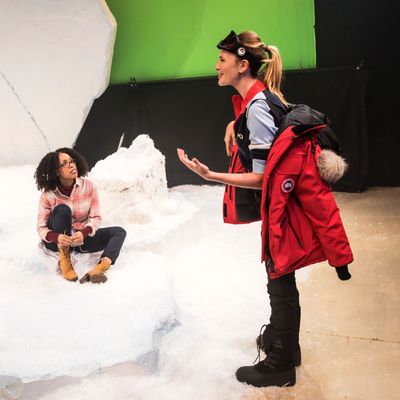
“You can blame it on continuity,” says a harried movie director into a walkie-talkie, giving the crew a reason not to let the diva leading actress change her hair. Bess Wohl’s smart, funny, and deeply sad new eco-drama is, its subtitle tells us, “A play in six takes”: It’s the story of a film crew desperately trying to get the shot before they lose the light. And it’s the story of a little, disparate group of people wrestling with the ungraspable enormity of climate change, all trying to do more helping than hurting, all wondering if that’s even possible, all staring—inquisitive, ashamed, frightened—into an approaching apocalypse, an ultimate dying of the light.
At the center of Continuity is Maria (Rosal Colón), an uncompromising director who won at Sundance and now is making her first studio movie. She and her crew are sweating to death in the New Mexico desert, where her actors are running around in winter gear atop a big incongruous ice-floe set (Adam Rigg did the show’s playful, effective scenic design). Maria is driven and principled — she wants to make a movie that will wake people up, that will do some good in the fight to reverse an impending climate disaster. But given studio pressure, the self-obsessed shenanigans of her famous lead actress, Nicole (Megan Ketch), and the fact that her bigshot screenwriter ex-boyfriend David (Darren Goldstein) is hanging around rewriting her material into schlock, Maria’s vision is melting quicker than the ice at craft services. “Look,” says Jake (Alex Hurt), the movie’s buff, insecure leading man, to a fresh-out-of-RADA young actress named Lily (Jasmine Batchelor), “the only reason this thing is even happening right now is that Nicole woke up one day, read a newspaper and was like, ‘Climate change!’ So they find her this tiny script everyone loves by this cool new female writer-director, and they get the great David Caxton—who she used to bang, B.T. dubs—and he does a few studio passes to justify Nicole’s paycheck, and at the end of the day, spoiler alert, they completely destroy it.”
Wohl’s dialogue is sharp and sprightly, confident and fluid through both the casual banter and the leaps into big emotions and ideas. Though the movie’s on-set science advisor, Larry (Max Baker), eventually busts out with a reprimand—not malicious, just full of a scientist’s sad skepticism—that brings Maria and her crew to their knees, Wohl nimbly avoids speechifying. No one holds forth in Continuity, at least, never in a way that flattens character in service of message. People stay people—messy and maddening and well-intentioned—rather than becoming mouthpieces. Director Rachel Chavkin leans into the humor just enough, keeping the action swift and the escalating comedy of errors on Maria’s set buoyant and amusing—in that familiar backstage way—until it’s not. A put-upon production assistant (Garcia) bustles around in the background, bringing Nicole (who can never remember their name) milkshakes and repeatedly replacing a Styrofoam ice rock that people keep breaking. “Just a reminder, everyone, not to sit on the rocks,” we hear through the speakers, in the nasal monotone of a crew member. “They are not weight-bearing. Please take care of our iceberg.”
It’s funny, and we laugh, but like its title, the play’s best jokes are always more than one thing. That broken rock is a running gag, but it’s also a reminder of just how much thoughtless destruction is wrought by even the most thoughtful human beings. It’s a “this is why we can’t have nice things” warning. Not to mention that the rock is Styrofoam—among the least environmentally justifiable materials—both in the world of the movie and in the reality of the play. Try as we might with our messages, how wasteful is the art we make? Is anything really sustainable? How do we hold all the questions in our minds at once without succumbing to paralysis? How do we keep caring?
The power of Continuity is that it lets these questions proliferate without, as a piece of theater, becoming either strident or floppy and overwhelmed. It’s got a huge sadness and a huge terror inside it—it’s walking gut-twistingly close to despair—but it’s also got integrity, vitality, and compassion for its characters. David will always be a bro-gressive philanderer. Nicole will always be the person who demands a private car when the rest of the cast gets a van, who wheedles for script changes, patronizes the crew, and does bumps in her trailer between takes (Ketch’s glassy-eyed, motor-mouthed version of the character is a particular treat). But they’ve both got their own loneliness, their own suffering, just like everyone else. The play isn’t out to save its characters — hurting doesn’t necessarily redeem a person. It just makes her one.
Both Wohl’s title and the play it encompasses straddle the very great and the very small, the cosmic and the downright petty, in a way that brings to mind Thornton Wilder’s zoom-ins and zoom-outs on the human creature’s place in the universe. For an artist—especially a filmmaker—continuity is about nit-picking the details, but for, say, a climatologist, it’s about stepping back, about recognizing that the earth isn’t “made of borders and walls” but is “one system,” interdependent and in grave danger. What’s so brave and so harrowing about Wohl’s project is that it is unsparing with itself: It questions not only art’s utility in the face of something as massive and dire as the warming of the planet, but also the very ethics of its existence. Are plays, movies, content (shiver) all part of the problem? And if they are, what’s left for the storytellers?
Continuity is at Manhattan Theatre Club’s Stage II.


